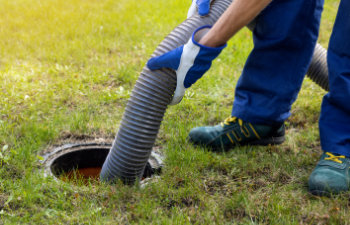
Most homeowners know that regular septic tank pumping is essential for maintaining a healthy septic system, but sometimes the typical three-to-five-year interval isn’t enough. At Metro Septic in Cartersville, we often get questions about what could require more frequent pumpings, and there are some common factors that can increase the demand on your system.
Let’s dive into the reasons you may need to pump your tank more often—and how it can protect you from costly repairs down the road.
1. Larger Household Size or Frequent Guests
The number of people using your septic system plays a big role in how quickly it fills up. A larger household (or regular visits from guests) means more water usage, which puts extra demand on the tank. More usage means more waste and solids entering the system, which can cause the tank to fill up faster than usual.
If your home has become a gathering spot for extended family or friends, or if your household has grown, you may need to schedule pumpings every two years (or even annually) to keep the system functioning smoothly.
2. Water-Intensive Appliances and Habits
Today’s modern households often rely on high-water-use appliances like dishwashers, washing machines, and water softeners. Frequent use of these appliances, especially if you’re running multiple loads daily, can overwhelm a septic tank and lead to more solids being flushed out, filling the tank at a quicker pace.
Metro Septic recommends spreading out loads of laundry and dishwashing across the week to reduce strain on your septic system. If that’s not possible due to a busy household schedule, plan on scheduling septic pumpings more frequently to avoid overloading your tank.
3. Non-Biodegradable Products in the System
Certain products don’t break down in your septic tank, which can lead to clogs and faster buildup of solid waste. Items like wet wipes, feminine hygiene products, and even some types of toilet paper are often labeled as “flushable” but don’t degrade quickly in septic systems. This can lead to a higher buildup rate in the tank.
If you’ve been flushing anything other than toilet paper and waste, you may need to pump the tank more frequently to prevent blockages and ensure smooth operation. Aim to only flush biodegradable materials, and consider annual pumpings if your system has been handling non-biodegradable items.
4. High Levels of Household Chemicals
Using a lot of chemical cleaners, antibacterial soaps, or other harsh products can disrupt the bacteria balance in your septic tank. Your septic system relies on naturally occurring bacteria to break down waste. When these bacteria are killed off by chemicals, solids can accumulate more quickly, requiring more frequent pumpings to prevent issues.
Natural or septic-safe cleaners are better choices for maintaining a balanced septic system. But if you’ve used a lot of chemicals in the past, it’s a good idea to schedule an extra pumping to give your system a fresh start.
5. An Older or Smaller Septic System
If your home has an older septic system, it may be less efficient than newer models, especially as it ages. Smaller tanks also fill up faster and may require pumpings more often to accommodate the waste from a busy household.
If your system is older or undersized for your household needs, Metro Septic suggests talking to a professional about a customized pumping schedule. This will help prevent backups and keep the system running as smoothly as possible.
6. Frequent Rainfall or Saturated Soil
In Cartersville and surrounding areas, periods of heavy rain or a high water table can affect your septic system’s ability to drain properly. When the soil around your drain field is saturated, it becomes harder for wastewater to disperse, which can back up into your tank and cause it to fill up faster.
If your property tends to experience water pooling or you’ve noticed backups after rainstorms, more frequent pumpings can help prevent problems from compounding. In some cases, additional drainage solutions may be recommended to support your septic system’s performance during wet seasons.
Stay on Top of Your Septic Needs with Metro Septic
If any of these factors apply to your household, more frequent septic pumpings may be necessary to keep your system working smoothly. Metro Septic in Cartersville offers flexible scheduling options, so you can set up regular pumpings based on your unique needs. Keeping up with pumping can extend the life of your system, prevent backups, and save you from costly repairs.
Contact Metro Septic today to discuss your septic needs or schedule a pumping—we’re here to help keep your home running smoothly!

